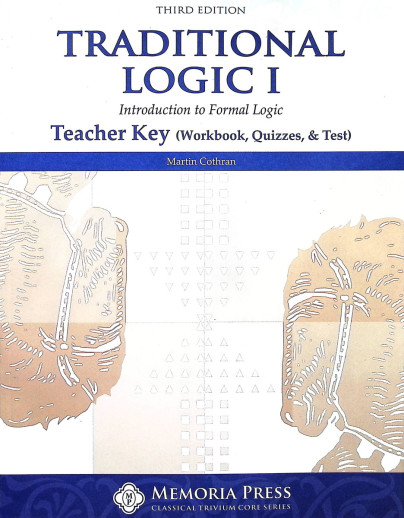We use cookies to make your experience better. To comply with the new e-Privacy directive, we need to ask for your consent to set the cookies. Learn more.
Traditional Logic I Teacher Key Third Edition
A logic course for all ages but designed for use as young as 7th grade, Traditional Logic is an in-depth study of the classical syllogism. Along with a basic understanding of the Christian theory of knowledge, the text presents the four kinds of logical statements, the four ways propositions can be opposed, the three ways which they can be equivalent, and the seven rules for the validity of syllogisms. Each chapter explains challenging concepts in clear, concise language. The Teacher Key ensures you have the answers for the workbook, quizzes, and tests.
An introductory and systematic course in formal logic that presents the concepts and methodology in a clear, concise and organized way. If the course presentation and layout is a reflection of a logical mind, and Martin Cothran wrote and laid out the course, then Martin Cothran has a logical mind. While this may or may not be true, it is, nonetheless, a valid argument. Written specifically for the home school environment, and for use by a teacher with no previous experience in formal logic, it seems a good candidate for a self-instructional course (provided you can offer help as needed). You will want to read the author's notes in the front of the text, as he suggests an alternate route through the book if students have trouble with the abstract concepts presented in the first three chapters. The author's targeted grade level is high school, but it may be used with "advanced" 7th and 8th graders or adults as well. If you are using the classical approach with your children, they will probably be ready for this course in junior high.
Two levels of the course are available. The Book I student text contains 14 chapters plus an introduction, each with short, daily lessons. The introduction provides an excellent background of logic as a methodology and science, and defines key concepts used in logic. The following chapters introduce and provide both the mental and verbal aspects of Terms (chapters 1-3), Propositions (chapters 4-9), and Syllogisms (chapters 10-13). Chapter 14 provides a comprehensive review. Each chapter is laid out for a clear presentation to aid student understanding. Headings throughout the text reveal the main points to be covered. Helpful sidebar notes highlight important definitions and concepts to remember. Occasional diagrams provide a visual illustration of concepts. A summary is provided at the end of each chapter. The student activities and questions for each chapter are located in the separate workbook. There are four exercise sets per chapter, divided by day. You will probably want your child to look at the exercise instructions first, as they also contain the reading plan for each day. A separate non-reproducible Quizzes and Tests booklet is available for additional reinforcement. The teacher key provides answers to the workbook, quizzes, and exams/tests. These are provided as completed responses on the workbook, quiz or test activity.
Book II is to be used only after completing Book I. It features a similar format, but the workbook also includes optional writing assignments to allow logic to be integrated with history, Bible, or English. More contemporary examples of arguments are included, as are case studies to show the relevance of logic in history, literature, religion, and philosophy. The goal, after all, is for the student to apply what he has learned in all areas of life. Section titles include Further Study of Simple Syllogisms (chapters 1-4), Arguments in Ordinary Language (chapters 5-6), Hypothetical Syllogisms (chapters 7-9), Complex Syllogisms (chapters 10-13), and the Oblique Syllogism (chapter 14). Like Book 1, student exercises are now located in a separate workbook.
Video lectures are available on DVD for Books I and II. There is now an online streaming option for the instructional videos too. Organized chapter-by-chapter, the videos let you see and hear the author himself teach the course. A great supplement for the student who tends to read and re-read the same page, but just doesn't "get it" until somebody else explains it.
Students who complete this course will have a college level understanding of traditional logic. As far as a comparison of this course to Introductory Logic and Intermediate Logic, I would just say that the approach is different, but the content overlaps (as you would expect). I would suggest that you look them both over to see which is the better fit for you.
| Product Format: | Softcover Book |
|---|---|
| Brand: | Memoria Press |
| Author: | Martin Cothran |
| Grades: | 7-12 |
| ISBN: | 9781547701247 |
| Length in Inches: | 11 |
| Width in Inches: | 8.5 |
| Height in Inches: | 0.3125 |
| Weight in Pounds: | 0.8 |

